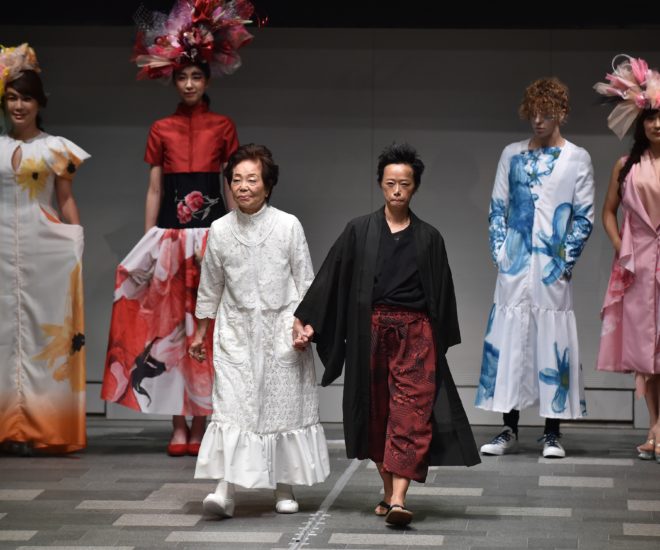Tokyo Over Paris: Why Japanese Fashion Should Choose
Tokyo may be the style capital of Asia, but with South Korea and China snapping at its heels and Japan’s most iconic brands rooted in Europe, the city is being urged to haul its fashion week into the big leagues. Given that the fashionably messianic (and thoroughly Japanese) Rei Kawakubo is the focus of the […]

Tokyo may be the style capital of Asia, but with South Korea and China snapping at its heels and Japan’s most iconic brands rooted in Europe, the city is being urged to haul its fashion week into the big leagues. Given that the fashionably messianic (and thoroughly Japanese) Rei Kawakubo is the focus of the Met Gala in 2017, it is perhaps time to look seriously once more at Tokyo and its somewhat lackluster Fashion Week.
Tokyo Fashion Week kicked off its spring/summer 2017 season showcase last week with six days of events intended to promote 50 brands, a mixture of the established and the new.
Yet Japanese labels that are household names in the West – led by Kenzo, Yohji Yamamoto, Issey Miyake and Kawakubo’s Comme des Garcons – eschew home shores for the bright lights, prestige and visibility of Paris.
Tokyo Fashion Week attracts only 50,000 visitors – just a quarter of the total number that attend New York’s two annual fashion weeks, and also lagging behind London, Paris and Milan.
Held after the fashion merry ground exhausts the “big four”, few make the extra trip to Tokyo, and not many in Japan believe they are missing out.
According to a poll from local website (in Japanese obviously) Fashionsnap.com, only 20 percent of the Japanese fashion industry, including designers, stylists and editors, consider Tokyo’s events to be of interest.
The calendar, the no-show by the biggest brands, reluctance to open their doors to the wider public and sluggishness to embrace see-now, buy-now were all listed as shortcomings by the 221 people surveyed.
Focus on Your Own
The award-winning, Milan-based Turkish designer Umit Benan, wants to change all that.
“Everyone needs to get together to make the Japanese fashion week much better,” the menswear designer told reporters after making his Tokyo debut, having announced he would ditch Paris fashion week.
He called Japan’s menswear the “most sophisticated you’ll see in the streets” and said Tokyo was packed with the world’s most creative buyers and designers, along with some of the most sophisticated consumers around.
“I think you really need to focus on your own fashion week, trying to create new waves in Japan fashion,” he said, joking that he loves Japan so much, he visited 40 times in the last five years.
He called Japanese fabric second only to Italy’s. But unlike in Italy, where high fashion is governed by precision, he said the Japanese were willing to take risks, such as mix nylon with cashmere.
“The Italians don’t have the balls to mix nylon into a 200 euro fabric,” he said. “In Japan they’re very flexible and very creative, spontaneous… when you touch it you’re like my God what is this?”
While Tokyo has long been a springboard for up-and-coming designers, neighboring Seoul, with its vibrant street style, and Shanghai, as the commercial capital of China, are attracting increased interest.
“To me, Tokyo is the Asian fashion center with long fashion-forward history,” said Hong Kong designer Vickie Au who brought her “Urban Chill” collection to Tokyo after showing in New York.
The street look, minimal style and clean lines of her House of V label, this season inspired by Canadian-American architect Frank Gehry is well suited to Japanese taste.
Beauty of the Craft
While she has boutiques in Hong Kong, China and Taiwan, and online, she is looking to break into the Japanese and US markets.
Au cited Yamamoto, the famed Japanese designer based in Paris, as an inspiration, praising him as a master of “modern and avant-garde tailoring”.
Christelle Kocher, creative director of up-and-coming French label Koche, also said she had learnt from Yamamoto and that it had been special to be the only French brand participating in Tokyo this season.
“Japanese culture is really refined and I think may be more than other places, they understand the beauty of the craft and the beauty of the time to make beautiful things,” she said.
US retailing giant Amazon is sponsoring Tokyo Fashion Week for the first time, and among the fashion set in Japan there are hopes that it can help rebrand the event into something brighter and larger.
The company is already the largest clothing retailer in the United States and fashion vice president for Amazon Japan, James Peters, signalled that he is determined to replicate that success in Japan.
While Tokyo still follows a six-month delay between catwalk and store, he said Amazon would be happy to help Japanese designers facilitate see-now, buy-now collections increasingly at the fore in New York.
“I think if that’s what the designers want to do, we’re ready to do it,” he told AFP at the week’s launch party.



